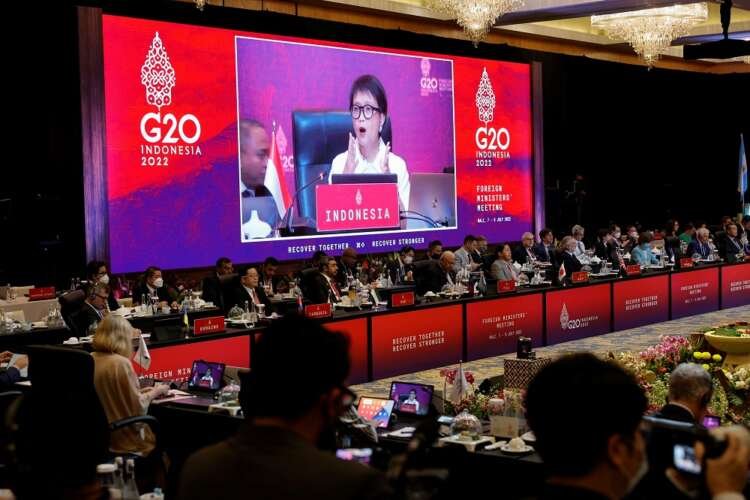War dominates G20 meeting as Russia chides West’s ‘frenzied’ criticism


By Stanley Widianto and David Brunnstrom
NUSA DUA, Indonesia (Reuters) -G20 host Indonesia urged the group’s foreign ministers on Friday to help end the war in Ukraine, as Russia’s top diplomat accused the West of scuppering a chance to tackle global economic issues with “frenzied” criticism of the conflict.
The gathering in Bali was dominated by the war and its impact on food security and energy, and it was discussed in almost all bilateral meetings, Indonesian Foreign Minister Retno Marsudi said in remarks after the talks finished.
It was not immediately clear from Retno’s briefing whether any agreements had been reached during the meeting.
At the start of the day’s events, shouts of “When will you stop the war” and “Why don’t you stop the war” were heard as Russian Foreign Minister Sergei Lavrov shook hands with Retno upon his arrival.
Lavrov said ministers from Western nations “strayed almost immediately, as soon as they took the floor, to the frenzied criticism of the Russian Federation in connection with the situation in Ukraine”.
“Aggressors’, ‘invaders’, ‘occupiers’ – we heard a lot of things today,” Lavrov told reporters after the first session of the talks, where he was seated between representatives from Mexico and Saudi Arabia.
Russia calls the war a “special military operation” to degrade the Ukrainian military and root out people it calls dangerous nationalists.
Ukraine and its Western backers say Russia is engaged in an imperial-style land grab with no justification for its invasion.
HEATED DISCUSSION
Retno opened the meeting calling on the G20 to “find a way forward” to address global challenges and said the repercussions of the war, including rising energy and food prices, would hit low-income countries the hardest.
“It is our responsibility to end the war sooner rather than later and settle our differences at the negotiating table, not at the battlefield,” Retno said at the opening of talks.
Challenges related to rising food and energy costs had been “dramatically exacerbated by Russian aggression against Ukraine”, U.S. Secretary of State Antony Blinken said on the sidelines of the meeting.
During the plenary, Blinken confronted Russia about blocking the export of Ukrainian grain and stealing it, a Western official said.
“He addressed Russia directly, saying: To our Russian colleagues: Ukraine is not your country. Its grain is not your grain. Why are you blocking the ports? You should let the grain out'”, the official said.
Lavrov was not in the room at the time, the official said.
Lavrov and Blinken did discuss things while in the meeting room, Retno said, without elaborating.
Ukraine, the world’s fourth-largest grain exporter, has struggled to export goods, with many of its ports blocked as war rages along its southern coast.
Lavrov told reporters later that Russia was ready to negotiate with Ukraine and Turkey about grain, but it is unclear when such talks might take place.
‘HUNGER GAMES’
The event hosted a closed-door meeting of top diplomats from G20 countries including China, India, the United States, Brazil, Canada, Japan and South Africa, as well as bilateral talks on the sidelines.
Meetings were overshadowed by the assassination of former Japanese Prime Minister Shinzo Abe, which Blinken described as “profoundly disturbing”, expressing shock over the death of “a leader with great vision”.
Ukraine’s foreign minister addressed the meeting virtually, accusing Russia of playing “hunger games” through its blockade of Ukraine’s Black Sea port.
Lavrov left the room during his speech, Ukraine’s ambassador to Indonesia said.
Chinese Foreign Minister Wang Yi said earlier that Beijing opposed any act of hyping up bloc confrontation, and creating a “new Cold War”.
Underlining tensions in the lead-up to the meeting, Retno said G7 counterparts had informed her they could not join Thursday’s welcome dinner, where Lavrov was present.
In her closing remarks Retno said the decisions of foreign ministers to attend had not been taken lightly given tensions over the war, and that all participants were concerned about soaring food and energy prices.
Some G20 participants called for an end to the conflict through diplomacy and negotiations, Retno said, adding that it was critical to reintegrate Russian fertilizer and Ukraine’s grain into the global supply chain.
Chinese and Australian foreign ministers were due to meet on Friday for the first time in three years, signalling a thaw in relations that have soured over claims of foreign interference and retaliatory trade sanctions.
(Additional reporting by Ryan Woo in Beijing, Kirsty Needham in Sydney and Yuddy Cahya Budiman in Nusa Dua; Writing by Kate Lamb; Editing by Martin Petty, Ed Davies and Raju Gopalakrishnan and John Stonestreet)
A special military operation is a term used to describe a military action that is conducted with specific objectives, often in a limited scope, as opposed to a full-scale war.
Explore more articles in the Top Stories category











